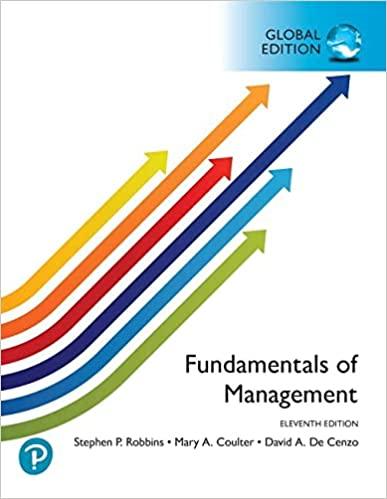In one of the worst business ethics scandals in history, the world learned in 2015 that Volkswagen
Question:
In one of the worst business ethics scandals in history, the world learned in 2015 that Volkswagen (VW) intentionally circumvented government exhaust emission tests for years by installing so-called defeat devices on its clean diesel vehicles.59 This revelation was a shock to many given the company’s longstanding success in the auto industry. Volkswagen, one of the world’s most recognized brands, was founded in 1937. The company,
headquartered in Germany, employs more than half a million people around the world. Worldwide, the Volkswagen Group has a long history of dramatic innovations. At its Electronics Research Laboratory based in Silicon Valley, the company blends German engineering with American ingenuity.60 Researchers at West Virginia University (WVU) first discovered the violation when they started studying clean diesel engines.
When they tested the performance of Volkswagen vehicles, they were surprised to find that on-the-road emissions exceeded government allowances by almost 40 times. Further investigation by the U.S. Environmental Protection Agency (EPA) found that the vehicles were actually equipped with software that could essentially
“trick” emission testing systems. The diesel engines would detect when they were being tested for emissions and change the vehicle’s performance to improve testing results. Once on the road, the vehicle would switch out of the test mode, emitting excessive nitrogen oxide pollutants, as the WVU researchers discovered.
The EPA’s finding covered about 500,000 cars sold in the United States only. But Volkswagen later admitted that about 11 million cars worldwide were fitted with this software. It will be a long time before Volkswagen realizes all the damage from this ethical blunder.
How could such a blatant ethical violation occur? It may take years to sort out who is to blame. CEO Martin Winterkorn,
who resigned in response to the scandal, initially claimed not to know about the devices. While many high-ranking executives were suspended, no one is sure who knew about or authorized the software. In fact, some believe that the driven, performancebased culture may be more to blame than any individual.
Winterkorn, who reinforced the unique culture, was described as a hard-charging perfectionist who was committed to secure the top spot among global car manufacturers. He was known to criticize employees publicly, and this generated both fear among employees and the commitment to do whatever necessary to ensure the company’s success. The company’s culture has been described as “confident, cutthroat, and insular.”61 It is possible that arrogance led VW managers to assume that U.S. government or other officials wouldn’t discover the misleading emissions tests.
What’s more unsettling was VW’s response to the scandal.
At first, the company suggested a technical problem with the cars, but it finally admitted the software devices were designed to cheat the system. And initially, the company reported that only a limited number of cars were affected; however, as more details were uncovered, the company admitted that more cars were outfitted with the device and that these actions occurred over a longer period of time than originally reported.
Current CEO Matthias Müller says he is trying to accelerate change at the automaker. He’s urging employees to prepare for rapid shifts in the auto industry, including, for example, autonomous driving, electric vehicles, “smart” engines, and picture navigation. Considering the fact that since 2015, when he was named CEO, he has spent as much time managing this ethics crisis as managing the business,
change is what is needed.62 And not only leading change into the world of modern automotive technologies, but changing the culture of a company. With a clear vision for the future direction that VW must go, Müller is making necessary, but difficult, decisions that are meeting resistance from managers and employees. However, that has not deterred him from doing what he believes is best to make VW a winner again.63 Note: In March 2017, VW pleaded guilty as a corporation to criminal charges stemming from the deception and a top Volkswagen official in the United States was handed a seven-year prison sentence. To this point, the scandal has cost the carmaker more than $20 billion in fines and settlements and tarnished its reputation.64 In addition, Chief Executive Matthias Müller has been replaced by Herbert Diess, a former BMW executive who runs the VW brand.65 Diess says he is committed to ‘evolution’ but at a faster pace.66
Discussion Questions
1. What external or internal forces—or both—for change do you see described in this case? Would you describe VW’s environment as more calm waters or white-water rapids? Explain.
2. Change needs to happen at VW. In the chapter, we defined change as any alteration of an organization’s people, structure, or technology. Which of these needs changing at Volkswagen? Discuss.
3. What organizational development (OD) efforts might work at VW? Explain your choice(s). What challenges will managers face in making these changes?
4. Look at the reasons people resist change. Which do you think are happening at VW What approach(es) would you recommend for overcoming this resistance to change? Give your rationale for each approach you choose.
5. Is an innovative culture always going to be at odds with an ethical culture? Or is an innovative and ethical culture possible? Gather your thoughts on this and then in your assigned group, come up with an answer. Support your conclusions.
Step by Step Answer:

Fundamentals Of Management
ISBN: 9781292307329
11th Global Edition
Authors: Stephen P. Robbins, Mary A. Coulter, David A. De Cenzo





